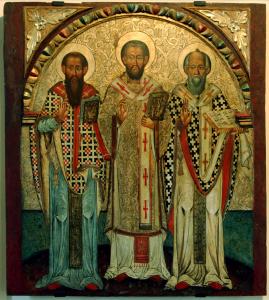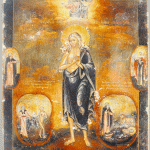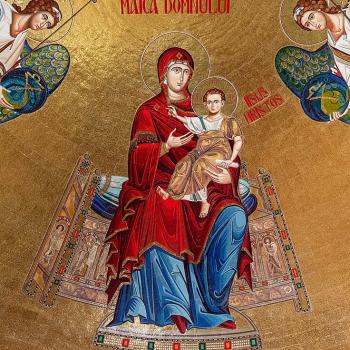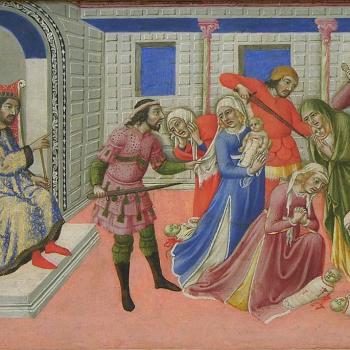 When early Christian communities needed a new bishop, the community was small, allowing the people within were able to know and suggest the best candidates for the position. This made it much easier to follow the recommendations for the bishopric found in Scripture:
When early Christian communities needed a new bishop, the community was small, allowing the people within were able to know and suggest the best candidates for the position. This made it much easier to follow the recommendations for the bishopric found in Scripture:
For a bishop, as God’s steward, must be blameless; he must not be arrogant or quick-tempered or a drunkard or violent or greedy for gain, but hospitable, a lover of goodness, master of himself, upright, holy, and self-controlled; he must hold firm to the sure word as taught, so that he may be able to give instruction in sound doctrine and also to confute those who contradict it (Tit. 1:7-9 RSV).
Christians were able to find and elevate many who were worthy into positions of authority into the church. This is not to say there was no in-fighting, no conflict of interest, and no one seeking power for their own advantage: the Acts of the Apostles with its discussion of Simon Magus should dispel such a romantic notion. But, so long as the community was small, and suffered no external nor internal challenges, the bishopric itself was able to be held by those most could and would respect.
During times of persecution, some of the church’s leaders, it is true, showed themselves to be cowards, willing to undermine the safety of the church as they apostatized for the sake of their own lives; others, however, showed themselves to be shrewd partakers of ecclesial offices, finding power in the position, working to elevate themselves above others, taking advantage of external strife to lift themselves up beyond the rest. Thus, it was not long before we find the beginning of the long and continuing conflict between the church’s actual mission and those who take leadership position in the church for their own private gain.
The more the position of bishop became recognized as a seat of power, the greater number of people would emerge who wanted that power and would do anything for it. They might speak the right words, making themselves look good and true, but they did not let the truth of those words penetrate their hearts, so that the church remained stable in teaching (thanks to the Holy Spirit, to be sure), but it did not remain in stable in charity and grace as such bishops began to divide and hinder the church from its true mission in the world. Those who were elevated to the bishopric and preserved Christian charity and virtue were often the ones wounded by the rest, a problem which remains to us to this day: many bishops, while they truly have an external glory and authority due to the grace found in the sacraments, are underneath it all spiritually dead inside, something which is easily noticeable by how they engage their power and authority. Are they looking for attention for themselves, promoting a legalistic agenda that might sound right but have no spirit of truth behind them, a spirit which should be as charitable and broad today as it was when Christ himself walked the earth, showing love to sinners to the disdain of the legalists of his day? If not, then we need to pray for them and those they hurt with their authoritarian destruction of the faith.
St. Gregory the Theologian famously dealt with these problems in his day. He was thrust into ecclesial politics by his friend, St. Basil, who had made him a bishop, only to find himself having to contend with the terrible truth that many desire to be bishops for the power, prestige, and money the office gave to its holder:
What is one to say though, when one thinks of really evil people? Because there are such: there are certain wretched folk, miserable and abominable monsters, ambiguous with regard to their faith, whose norm is opportunity, not the law of God. [1]
Theology, to be sure, was expected of such bishops, so they combined their theological excesses (good or bad) with their desire for power, making even those who often proclaimed the truth in their mouths unworthy of respect and praise because of their deeds. His discontent finds itself speaking with a voice which is much needed today:
Bad Bishops. Don’t be overawed by the dignity of the throne. All have the dignity, yes; but not all have the grace. Discard the outer clothing; watch for the wolf. Words do not convince me; I must have deeds.[2]
While St. Gregogy recognized that theological words and debates can be important (he was engaged in such a war of words with several heretical groups in his day), he also knew how much of the debate was for the people involved a power struggle more than it was concern for the truth and its implications in the lives of those involved. Deeds, he said, would help determine who was putting on the authority of a bishop for their own gain or for out of true love for God and the Christian faith. Those who love Jesus would do as he commanded, which was more than just argue the fine points of theology but to engage the people, to work for the liberation of those oppressed by sin. He could, then, see something good to praise if bad bishops at least spoke the right words, but personally, they disgusted him:
Teachings that are rendered null by lives I abominate. I must praise the outer coloring of the sepulchre; but the stench of rotten bodies within disgusts me. [3]
Gregory, while trained in oratory and himself capable of great speeches, felt what was more important is a simple but true faith shown in humble action than what is found in those who can weave a great theological sermon to glorify themselves. They did not know the true meaning of the theology, which is not about who is the most charming in what they say, but who is best at following God:
Let me have someone with the qualities of faith of an apostle. He is without money, without wallet, without staff, half-naked, unshod as well, living for the day, rich only in hope. He is not the sort of man to court the reputation of persuasive speaker, let he seem to depend on that for his effect. [4]
Thus, just as a hearty, but rustic meal, is more beneficial than dainty sweets, so a solid, good leader who is simple in speech but full of faith and charity is able to give more than those who like to hide their weakness through superficiality:
Your style may be pedestrian, your speech rustic, it makes no difference to me. I, too, know the lowly pathways. A frugal table pleases me more than one decked out artificially with dainties. The same with clothes, natural beauty is so much superior to what artifice can produce. [5]
Sadly, with the desire many had for office, this spirit was lost by those who saw the bishopric a position by which their personal ambitions could be fulfilled. They became, as it were, authorities who had no business being put in such a position; often, their walk of life before their elevation showed the absurdity of their ordination:
And you, sir, were a pleader up to recently. You did good business in the courts, twisting the law this way and that. You were proficient at ruining people whom justice might have delivered, because your standard for justice was the fattest fee. And now you’re a judge, a Daniel all of a sudden. You who used to dispense justice under the sign of a naked sword, making legitimist brigandry of the bench, tyrannizing most of all over the very law itself, have become all gentle now. Apparently you change your character as readily as other people their clothes. The other day you went about with effeminate dancers, your performed at weddings with a chorus of Lydian girls, crooning ditties and getting high in your cups. And now you’re the counsellor of virgins and matrons; but your former behavior makes your virtue somewhat questionable I fear. Today’s Simon Peter is the Simon Magus of yesterday; it’s all too precipitate, this transformation from fox to lion.[6]
While Christianity had, in some ways, been made free and so spread throughout the known world, the leaders of the Christian faith, the bishops, seemed to be the ones who least participated in that grace:
What a mystery really: the splendid wave of salvation from God pervades practically the whole universe in our day, as against the very wretched bishops who constitute our lot. [7]
What Gregory saw in his day, the warnings Gregory gave to his fellow bishops, needs to be heeded today. Those who like to show off, who like their legalistic twisting of the law as a way to limit the charity and grace of God in the world, continue to burden the people in the same way as they did in Gregory’s time. They might not have the same level of political authority today (thanks to the separation of church and state), but many bishops, with their vocal followers, are still able to become thorns in the church, causing it harm as they try to hinder the beauty of God’s grace to penetrate the church and elevate all in it to the perfection God wants in the world. Love is lost to them in their political power plays, not by being politicians, but working for and playing defense for deplorable politicians when there is no authentic Christian defense which can be given to justify such deference. What Gregory said in his poem might be best said about such bishops today: “However I should not wish the wicked to be altogether triumphant, or their path made smooth without a protesting voice being raised.” [8] Yes, objection to them must be done in humility and love, respecting the office, but this does not mean we can’t be repulsed by those liches who have died to the spirit; far from being the best of us, they are dead inside, unworthy of the office which they have undertaken.
[Image=Three Great Hierarchs St. Basil, St. John Chrysostom and St. Gregory the Theologian by Przykuta (Przykuta) [Public domain], via Wikimedia Commons]
[1] St. Gregory of Nazianzus, “Concerning Himself and the Bishops” in Three Poems. Trans. Denis Molaise Meehan, OSB (Washington, DC: CUA Press, 1986), 59.
[2] Ibid., 50.
[3] Ibid., 50.
[4] Ibid., 55.
[5] Ibid., 58.
[6] Ibid., 62.
[7] Ibid., 60.
[8] Ibid., 49.
Stay in touch! Like A Little Bit of Nothing on Facebook

















